Marie Davidson’s lifelong equestrian experiences and a medical miracle brought her to Ocala, where she is the program manager of the CF equine studies program, which is celebrating its 20th anniversary.
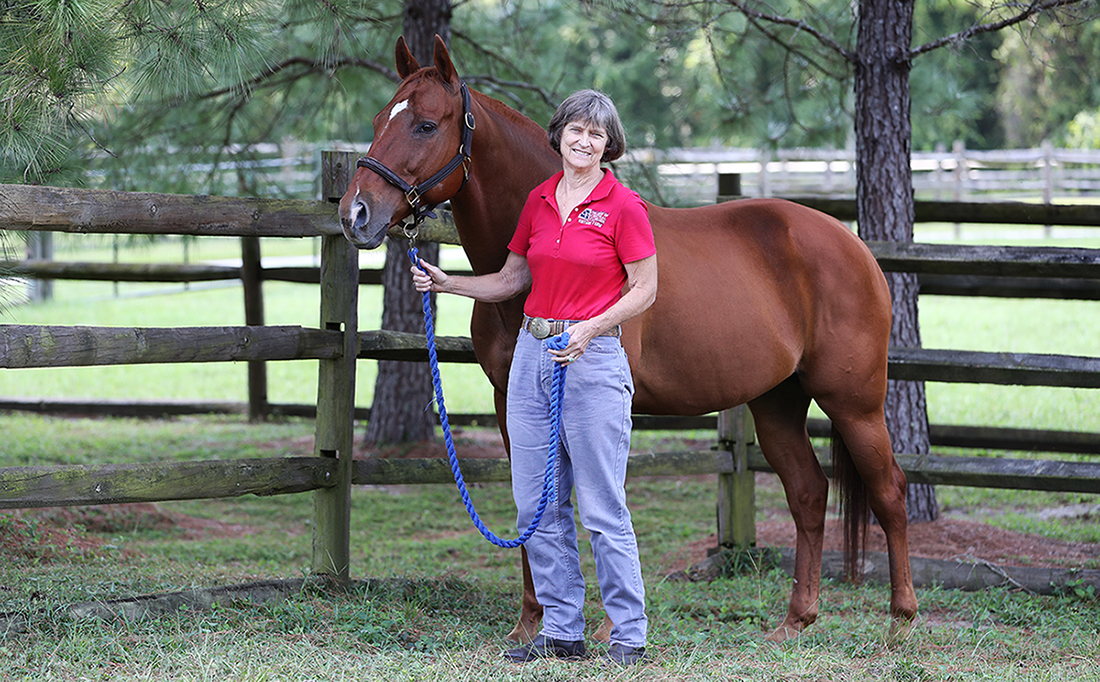
What a person wears can tell you a lot about them. One case in point is Marie Davidson’s Western belt buckle.
“I was a horse-crazy only child in a non-horse family. And, of course, I was always begging for a horse,” shares Davidson with a small smile and a twinkle in her blue eyes. “I was also very introverted, so my parents knew they needed to get me involved in something. So, they found a riding lessons stable nearby and I started lessons when I was 6.”
As luck would have it, Davidson’s first trainer at that riding lessons stable in Germantown, Tennessee, was a young Melanie Smith. The latter would go on to become a member of the United States Show Jumping Team that won a Gold Medal at the 1984 Los Angeles Olympics.
“Of course, years later I realized how fortunate I had been that Melanie Smith was my first trainer,” says Davidson. “And throughout my childhood, my parents made sure that I always had the best possible trainer. My father was a forester with the U.S. Forest Service and we moved every two years. As soon as we settled in a new town, my parents would start checking out trainers for me.”
The next move for Davidson was to Little Rock, Arkansas, where she finally got a pony.
“I was 9 when my parents bought me Pepper, a 13.2 hands crossbred mare. We saved her from a kill pen, meaning she would’ve been killed if we hadn’t bought her,” explains Davidson. “We boarded Pepper at a farm owned by Jim Loveless, who was a well-known cutting horse trainer, and I, of course, started taking lessons from him.”
Working with Loveless would be a revelation for Davidson.
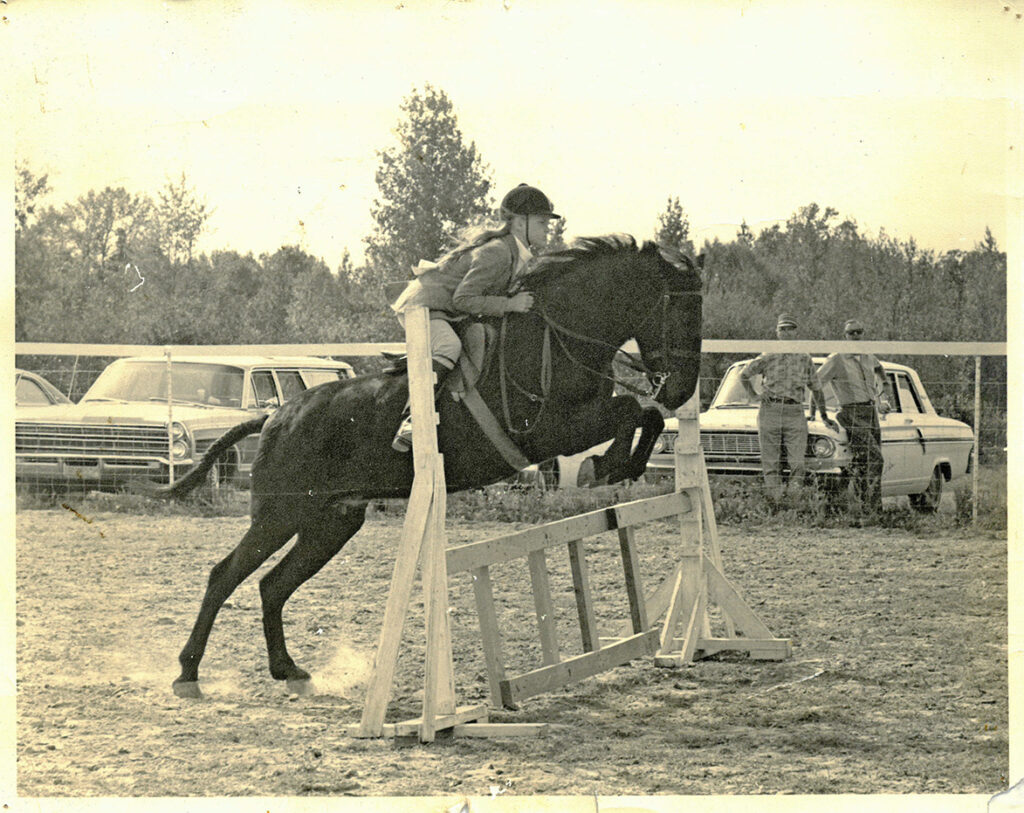
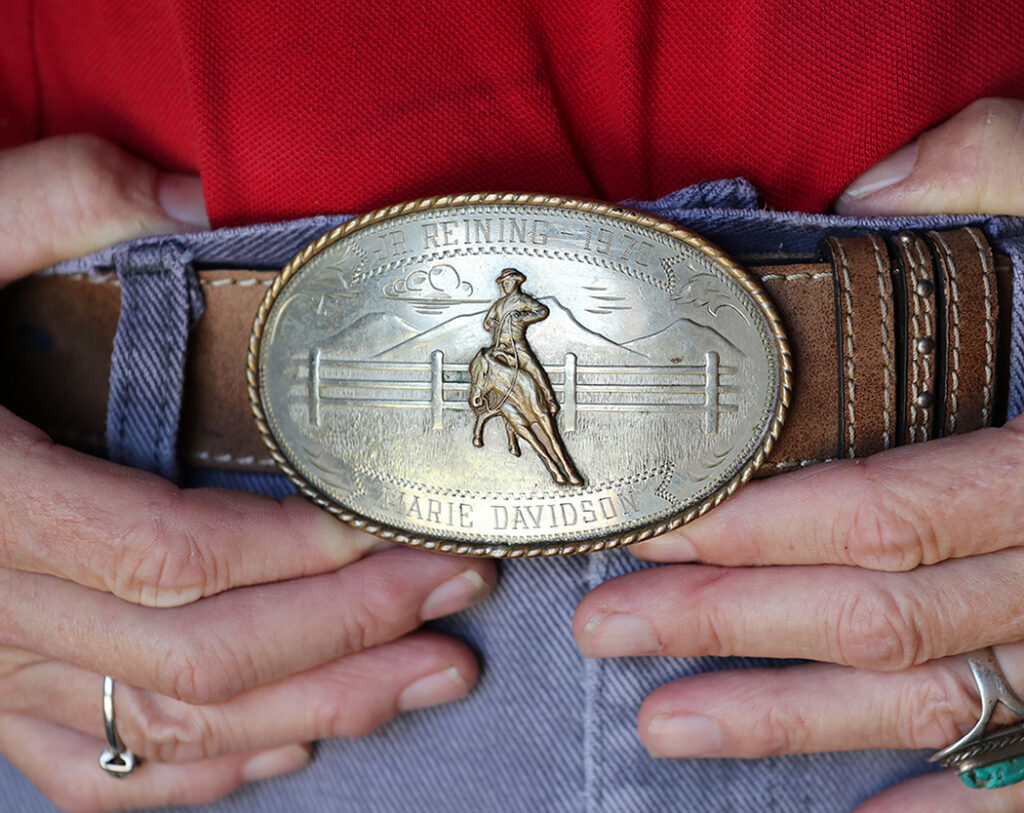
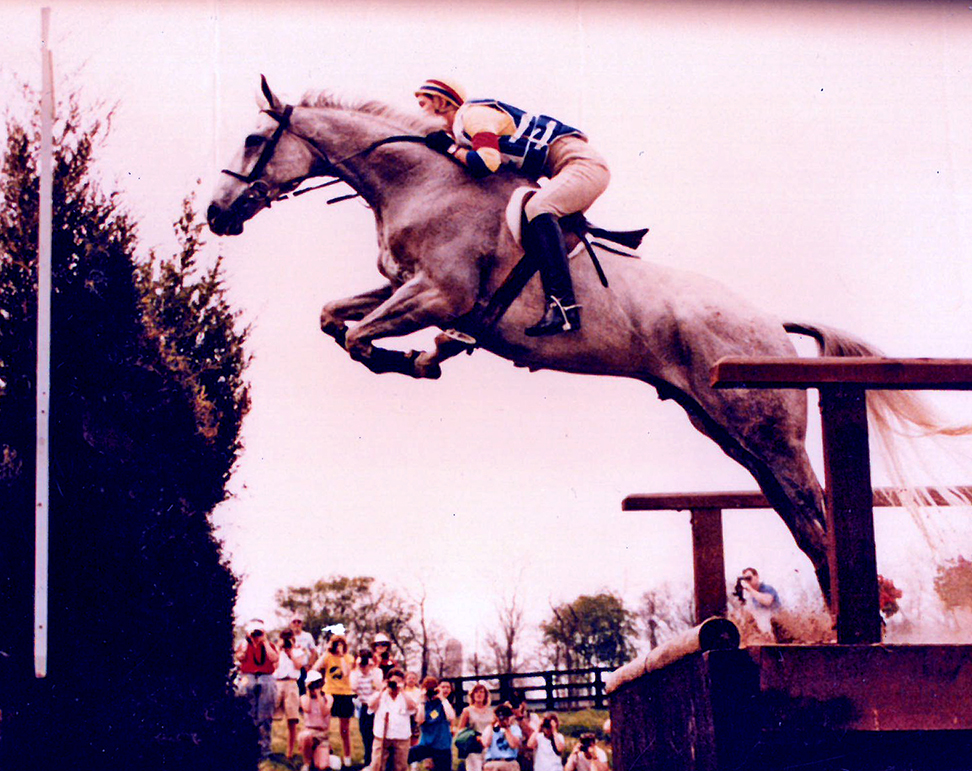
“He really helped me turn Pepper into a real competitor and he liked my tenacity as well,” notes Davidson. “He even put me on his top cutting horse to learn to ride changes and patterns. And those basic skills, which are so much about balance, have helped me throughout my riding career.”
She was soon competing in local rodeos.
“I won my first belt buckle in reining when I was 9, in 1970. I won that buckle riding Pepper, my kill pen pony, competing against cowboys up to age 16 riding nice quarter horses,” says Davidson, pointing to that very belt buckle she is wearing on this day and most days. “This belt buckle is a sentimental thing for me as it started my journey on a path where I went for things that seemed out of reach. Winning that belt buckle had a huge effect on becoming the person I am, and it keeps me grounded.”
Following The Hoofbeats
Two years after winning that belt buckle, Davidson moved to Maryland, where she joined the Redland Hunt Pony Club.
“This club was led by an amazing group of horsemen and horsewomen, who I learned so much from during my time with them,” notes Davidson. “I rode multiple disciplines, hunter/jumper and dressage. I also competed in my first horse trial, my introduction to three-day eventing. Pepper and I won; I was hooked on the sport.”
While at a club meeting, Davidson was introduced to acclaimed equestrian Bruce Davidson, no relation, who had won a U.S. Three-Day Event Team Silver medal at the 1972 Olympics. In 1974, Bruce Davidson became the first American to win the World Championship Three-Day Event in Burghley, England, which he won again in 1978 in Kentucky. He followed that with U.S. Three-Day Event Team Golds at the 1976 and 1984 Olympics, as well as collecting another Team Silver at the 1996 Olympics.
“I was 13 when I first met Bruce and thrilled when he told me to look him up if I ever got to Pennsylvania, where he was based,” recalls Davidson. “Well, of course, we did move to Pennsylvania when I was 14. My father purposely took a job in Philadelphia but bought a house in southeastern Pennsylvania in the middle of horse country so I could train with Bruce. At 14, I became one of his first working students and really began my three-day eventing journey.”
She worked with the Olympian rider all through high school and for several years afterward.
“During my time with Bruce, I was able to compete with several horses at the lowest of the international levels and then work my way up,” reveals Davidson. “He helped me learn how to train young horses and created opportunities for me to ride some very nice horses. I went on to win the United States Combined Training Association (now the United States Eventing Association) Young Rider of the Year award in 1981.”
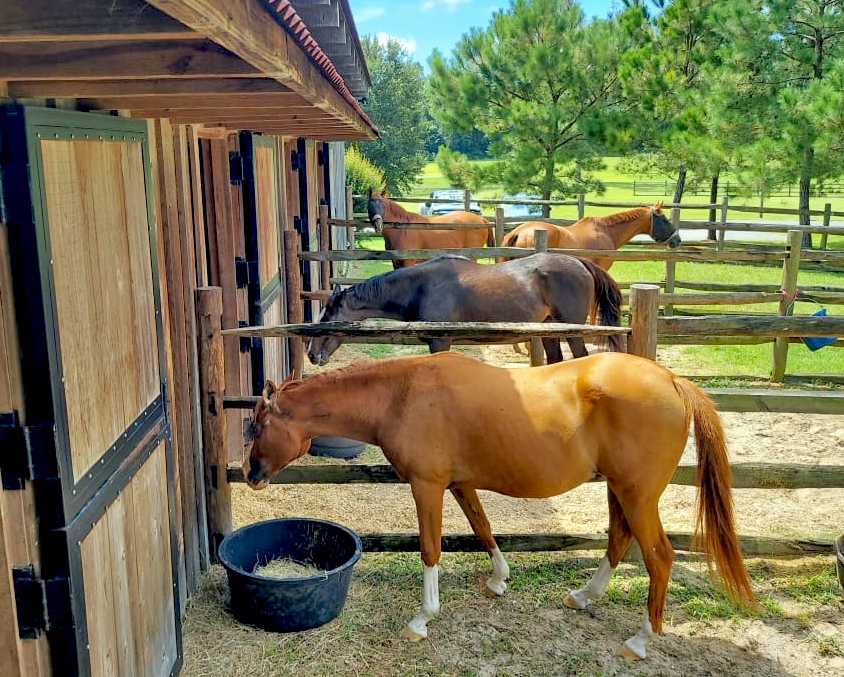
By age 16, Davidson was training client horses on her own.
“I was still working for Bruce on weekends and holidays, but also now training as well to support my riding habit,” says Davidson. “Many of the horses that I trained came as referrals from Bruce.”
Davidson’s equestrian experiences also branched out to training thoroughbreds and volunteering at a veterinary clinic.
“I had the opportunity to break and train some young thoroughbreds at Derry Meeting Farm. I also exercised some racehorses during that time. It was a lot of fun and gave me more experience with different horses in another discipline,” Davidson shares. “I also started riding with some veterinarians from the nearby Delaware Equine Center and then began volunteering at the center as well. And that’s where I met the horse of my lifetime.”
The unraced thoroughbred gelding named Doubt About was known as Monk.
“Monk was there for some minor surgery. He was only 2, but he was 17.1 hands and a rose gray with big white spots. In the right light, that rose gray color can look purple,” describes Davidson. “This funny-looking horse stood there, looking at me with this arrogant expression on his face, sizing me up. I was smitten. But Bruce talked me out of buying Monk.”
Three years later, Davidson got a call from Monk’s owner.
“He had been unable to sell Monk, but I just didn’t have the money to buy him,” admits Davidson. “My grandmother knew how much I wanted that horse and bought him for me. He was my dream horse until he died at 27.”
While attending Penn State, Davidson qualified to train by invitation with the U.S. Olympic Three-Day Event Team at its headquarters in Hamilton, Massachusetts. She rode several horses, including Monk, while she was in Young Rider Development & Training (1981-1982), on the Olympic Long List (1983-1984) and Olympic Training List (1987-1988).
“These were amazing years for me and Monk,” says Davidson. “I got to train with Jack Le Goff, the U.S. Olympic trainer, and be around all those accomplished equestrians.”
Always the overachiever, Davidson also spent a year studying in Strasbourg, France, before graduating in 1987 on the Dean’s List with a bachelor’s in general arts and sciences. All of this happened even though she was diagnosed with type 1 diabetes, an autoimmune disease that attacks the pancreas.
“I look back now and have no idea how I did what I did,” notes Davidson, who began having to take insulin shots with her diagnosis. “The only explanation that I have is that I was possessed and obsessed.”
Life Changes & A Miracle
In 1995, Davidson moved to Flagstaff, Arizona, where she continued her equine endeavors while adding another degree. In 2001, she earned a master’s in bilingual multicultural education with a teaching certificate in special education from Northern Arizona University.
“I taught riding lessons, schooled horses for clients and competed with younger horses at lower levels. After graduation from NAU, I taught special education to 4th-6th grade students with behavioral challenges in Flagstaff public schools. But I got quite sick from the type I diabetes and had to quit,” says Davidson. “In 2008, I became a vet tech and later office manager at Cave Creek Equine Surgical and Diagnostic Center. I learned a lot about regenerative medicine there, but after a while the commute from Flagstaff to Cave Creek was taking a toll on my health.”
In 2010, shortly after leaving the Cave Creek position, Davidson, then 51, suffered a near-death drop of blood sugar that caused her kidneys to fail.
“I spent two years on dialysis while I continued the best that I could giving riding lessons. But as time went on, it was clear this was not a good situation,” she admits. “My parents, who were now living in Lakeland, Florida, came and brought me to live with them. After testing at Tampa General Hospital, it was determined that I needed not only a kidney transplant but a pancreas transplant as well.”
Davidson recalls wondering if she’d live long enough to get the life-saving transplants.
“Only a few weeks after the tests, I got a call from the transplant unit at 4:30am and was asked how fast could I get to the hospital,” shares Davidson. “I replied how fast do you want me? I got my transplants the next day. After the surgery, I felt 100 percent better the moment I woke up.”
Now feeling healthier than she had in years. Davidson, who will have to take anti-rejection drugs for the rest of her life, was anxious to resume her equestrian activities. She also realized that to stay healthy, she needed to stay close to Tampa General Hospital.
“I started doing online research on equine-related opportunities and that’s how I found the CF equine studies program in Ocala,” Davidson recalls. “I sent Dr. Judy Downer, who was the program manager, an email with my resume and she invited me to come visit her, which of course I did. We had a nice chat, but she said that I couldn’t teach without a master’s in animal science or something related to equine studies. But with my background and experiences, she was willing to have me come team-teach with her to see how I liked it. Well, I loved it.”
Davidson also added to her educational resume.
“In 2015, I completed an online master’s in equestrian education from William Woods University in Fulton, Missouri,” says Davidson. “Now I could teach equine studies program classes as an adjunct professor.”
In 2020, Downer, who had been the CF equine studies program manager since 2004, retired. Davidson then became the acting program manager, officially taking on the position in the summer of 2021.
“Dr. Downer was brilliant in managing and growing the equine studies program,” says Davidson. “I learned so much from her and I’m honored to continue her legacy.”
A Vintage Gift
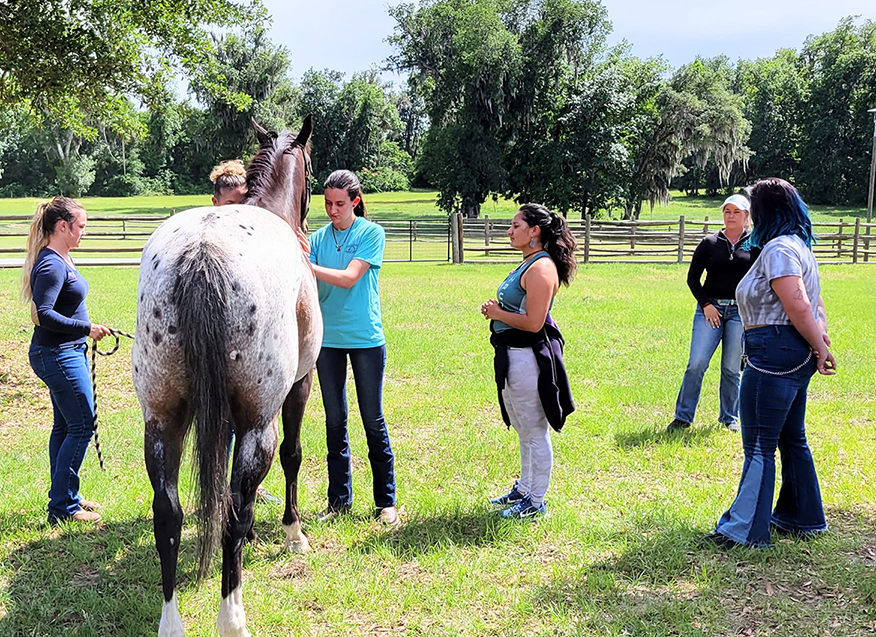
In December 2016, Vintage Farm, a 103-acre south Marion County farm valued at more than $2.9 million, was donated to the CF Foundation. The longtime supporter of education and agriculture wished to remain anonymous. Vintage Farm, five miles from the main CF campus, is shared by CF’s agribusiness and equine studies programs. In 2021, the equine studies classes began moving to Vintage Farm and now all the classes are held there. The barns and paddocks are well-suited for the hands-on classes.
“We are so fortunate to have Vintage Farm. It’s the perfect setting for the program,” notes Davidson. “We have two leased horses, Ellie, a thoroughbred mare, and Dolly, an Arabian mare, who live on the farm. I bring in my two thoroughbred geldings, Rio and Bounce, and other horses as needed. We bring in guest speakers in a wide range of equine-related businesses. We take field trips to area farms and veterinary clinics, as well as volunteer at area events. Our students get a great all-around equine education.”
The first equine studies program classes were held in 2003 and included only two classes, nutrition and a survey of the equine industry. Today, the equine studies program, which is part of the CF Business and Technology Department, offers a full schedule of classes in equine business and equine exercise physiology. Students can earn a bachelor of applied science in business and organization management with an equine studies specialization, an associate in science in equine etudies with specializations in exercise physiology or business management, and college credit certificates in equine technician or equine assistant management. Classes are held Monday through Thursday at Vintage Farm.
In addition to Davidson, the equine studies program instructors include full time professor Angie Adkin and adjuncts Katie Bigge, Cori Wiygul, Madelyn Smythe and Jessica Simons.
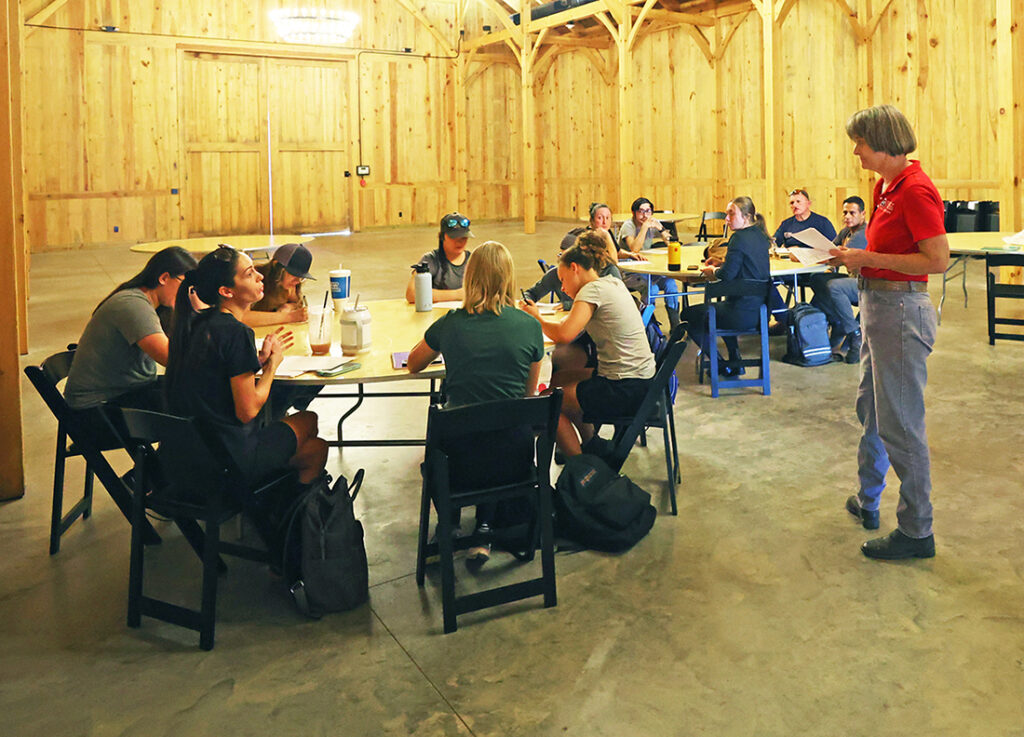
“We have a great team, and we couldn’t do what we do without them. We have a wide range of students in our current enrollment of 130,” notes Davidson, who now lives in Summerfield, only minutes from Vintage Farm. “We have all ages, some with equine backgrounds and some with none. We have students who are working toward an equine-specific career and others who work in careers such as real estate or insurance, where some of their clients are horse people.”
Davidson, who teaches several classes including locomotion, equitation science and advanced handling, is not one to take her equestrian life for granted.
“I have been so fortunate to have the equine education and experiences that I have had in my life,” says Davidson, 62, with a sigh of true gratitude and then a small smile. “I can’t think of anything better than being involved with the CF equine studies program and paying that forward.” OS






